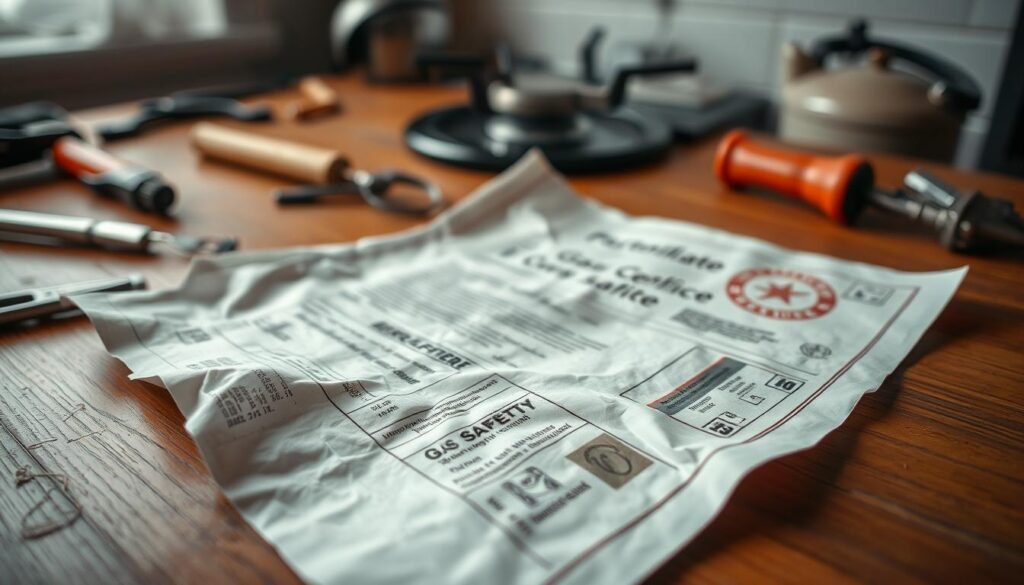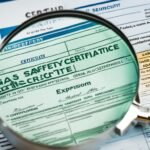Are you a UK landlord with an expired gas safety certificate? This important document is often forgotten. It can lead to legal trouble and risk your tenants’ safety. With over 170 Acts and Regulations for London landlords, it’s easy to feel lost. But don’t worry, this guide will help you fix the issue and keep your property safe.
Keeping gas safety in check is crucial for rental homes. Landlords must inspect gas appliances yearly and give tenants a valid certificate within 28 days. Not doing this can cost up to £6,000 or even land you in jail. Knowing your duties and your tenants’ rights is key to keeping your property in order and following the law.
Key Takeaways
- Gas safety certificates expire after 12 months and require annual renewal
- Landlords face fines up to £6,000 or imprisonment for non-compliance
- Annual gas safety checks are mandatory for most rented properties
- Tenants must receive a copy of the gas safety certificate within 28 days
- Expired certificates can prevent landlords from serving Section 21 notices
- Landlords cannot delegate gas safety responsibilities to tenants
- Managing agents can handle gas safety checks if specified in the contract
Understanding Landlord Gas Safety Certificates
Landlords in the UK must keep their tenants safe, especially with gas appliances. The CP12 certificate is key for this, acting as a crucial document in property management.
What is a CP12 Certificate
A CP12 certificate, or landlord gas safety certificate, proves gas appliances in a rental property are safe. It’s given by a Gas Safe registered engineer after a detailed check of gas systems and appliances.

Legal Requirements for UK Landlords
Landlords must get a valid CP12 certificate every year. They need a Gas Safe engineer to inspect all gas appliances. They must give tenants a copy of this certificate within 28 days.
Importance of Gas Safety Compliance
Following gas safety rules is not just a law; it’s vital for tenant safety. Not doing so can lead to big fines, up to £6,000, or even jail. Also, not having a valid certificate can make insurance policies invalid and lead to lawsuits.
| Aspect | Requirement | Consequence of Non-Compliance |
|---|---|---|
| Inspection Frequency | Annual | Legal penalties, void insurance |
| Certificate Provision | Within 28 days of check | Breach of regulations |
| Engineer Qualification | Gas Safe registered | Invalid certificate, safety risks |
| Record Keeping | Minimum 2 years | Difficulty proving compliance |
What To Do If Your Landlord Gas Safety Certificate Has Expired
If your gas safety certificate has expired, you must act quickly. Renewing these certificates is a key responsibility for landlords. In the UK, Gas Safe engineers must check gas systems every year.
Start by booking an inspection with a qualified engineer without delay. Ignoring this could lead to fines of up to £6,000 and even jail time. The risks are too high to ignore.

When you book the inspection, tell your tenants about it. They have the right to see the current certificate. Keep all records of communication and inspection attempts. This shows you’re trying to follow the rules.
Gas safety checks can be booked up to two months before they’re due. This gives you time to stay compliant. But remember, UK law doesn’t extend a certificate’s validity if checks are late.
- Contact a Gas Safe registered engineer immediately
- Inform tenants about the situation and inspection date
- Keep records of all communication
- Provide the new certificate to tenants within 28 days of the check
Dealing with an expired gas certificate quickly keeps everyone safe. It also protects your property and avoids legal trouble. Always put gas safety first in your rental homes.
Legal Implications of an Expired Gas Certificate
Letting a property without a current gas safety certificate can cause big problems for landlords in the UK. It’s not just about money. It can affect how tenants are treated and might even lead to criminal charges.
Potential Fines and Penalties
Landlords could face big fines for ignoring gas safety rules. Renting out a property without a valid certificate can cost up to £6,000. If there are more breaches, the fines can go up without limit.
Criminal Prosecution Risks
Not having a valid gas certificate can lead to more than just fines. Landlords might even face jail time for up to six months. This shows how seriously the UK takes gas safety issues.
Impact on Tenant Rights
An expired gas certificate helps protect tenants. They can stop paying rent and might get compensation for living in danger. Also, landlords can’t use certain eviction notices, making it harder to get the property back.
| Legal Consequence | Impact on Landlord | Impact on Tenant |
|---|---|---|
| Fines | Up to £6,000 per offence | Potential compensation |
| Criminal Prosecution | Risk of imprisonment | Increased legal protection |
| Eviction Rights | Loss of Section 21 notice use | Enhanced security of tenure |
Local authorities might take action against landlords who don’t follow the rules. They could even stop the property from being used. This shows how important it is to keep gas safety certificates up to date for both legal reasons and to protect tenants.
Steps to Renew Your Gas Safety Certificate
Renewing your gas safety certificate is vital for UK landlords. It ensures you meet legal standards and keep your tenants safe. The process involves several important steps.
Finding a Gas Safe Registered Engineer
Finding a qualified Gas Safe engineer is the first step. They must be on the Gas Safe Register. You can find one using the official website’s search tool. Always check their credentials before the inspection.
Booking an Inspection
After finding an engineer, book your gas safety inspection quickly. Landlords need to renew their certificate every 12 months. Pick a time that works for you and your tenants. Make sure to let your tenants know when the engineer will visit.
Required Documentation
Get all the documents ready for the inspection. This includes past gas safety records and user manuals for gas appliances. The engineer will check all gas appliances, flues, and pipework. Make sure any repairs are done before the inspection to avoid delays.
After a successful inspection, you’ll get a new gas safety certificate. Give a copy to your tenants within 28 days. The cost of a gas safety check is between £60 to £100, based on the number of appliances. Not having a valid certificate can lead to fines up to £6,000 per appliance.
Tenant Rights Regarding Gas Safety
Tenants in rented properties have important rights about gas safety. Knowing these rights helps keep living spaces safe. It also makes sure landlords follow the law.
The main tenant right is the annual gas safety check. Landlords must get a Gas Safe engineer to check gas appliances and pipes every 12 months. This rule applies to all types of landlords.
After the check, tenants should get a gas safety record within 28 days. New tenants must get this before they move in. This record is key for safety in rented properties.
- Right to a safe gas supply and appliances
- Annual gas safety checks by qualified professionals
- Timely provision of gas safety records
- Smoke and carbon monoxide alarms in appropriate locations
If landlords don’t meet these rules, tenants can report gas problems. They can tell the Health and Safety Executive or their local council. This can lead to action to fix safety issues.
| Tenant Right | Landlord Obligation |
|---|---|
| Safe gas installations | Annual checks by Gas Safe engineer |
| Gas safety record | Provide within 28 days of check |
| Functioning alarms | Install and check at tenancy start |
| Report safety concerns | Address issues promptly |
Tenants should work with landlords for gas safety checks. But, they can say no if they’re not given proper notice. By using these rights, tenants help keep their homes safe and healthy.
Cost and Timeframes for Gas Safety Checks
Gas safety checks are key for property management in the UK. Landlords need to know the costs and when to do them to follow the rules.
Average Inspection Costs
The price of gas safety checks changes based on where you are and how big your property is. Usually, it costs between £60 and £100 each year. It’s a good idea to set aside money for these checks and for any repairs that might be needed.
Duration of Validity
A Gas Safety Certificate, or CP12, is good for 12 months after it’s given. This matches the law that says checks must be done every year. It keeps tenants safe.
Renewal Windows
The Gas Safety Rules let landlords choose when to do checks. They can do them up to two months early but still keep the original date. This makes it easier to plan checks without losing the certificate’s value.
| Certificate Type | Frequency | Validity | Issued By |
|---|---|---|---|
| Gas Safety Certificate (CP12) | Annual | 12 months | Gas Safe registered engineer |
| Energy Performance Certificate (EPC) | Before letting or selling | 10 years | Accredited energy assessor |
| Electrical Installation Condition Report (EICR) | Every 5 years or new tenancy | 5 years | Qualified electrician |
Knowing these costs and times helps landlords plan and budget for gas safety checks. This ensures they meet the rules and keep their tenants safe.
Maintaining Gas Safety Records
Keeping gas safety records right is key for landlords in the UK. It’s not just about following the law; it’s about keeping tenants safe and looking after your property. Let’s look at the important parts of keeping and storing gas safety records.
Record Keeping Requirements
UK law says landlords must keep gas safety records for at least two years. These include gas safety certificates, inspection reports, and maintenance logs. It’s important to keep track of when certificates expire so you can renew them on time.
| Document Type | Retention Period | Purpose |
|---|---|---|
| Gas Safety Certificate (CP12) | 2 years | Proof of annual inspection |
| Inspection Reports | 2 years | Details of checks performed |
| Maintenance Logs | 2 years | Record of repairs and upkeep |
Documentation Storage
Landlords can keep gas safety records on computers or in paper files. Storing them online is okay if you can print them when needed. It’s important to keep these documents safe and backed up to avoid losing them.
Keeping proper records is not just about following rules. It’s a big part of being a responsible landlord. By keeping detailed gas safety records, landlords show they care about their tenants’ safety and property management.
Emergency Procedures for Gas Safety Issues
Quick action is crucial when dealing with gas leaks. Landlords must have clear emergency plans and share them with tenants. These steps are vital for keeping tenants safe and protecting the property.
If a gas leak is suspected, tenants should:
- Turn off the gas supply immediately
- Open all windows and doors for ventilation
- Evacuate the property promptly
- Call the National Gas Emergency Service on 0800 111 999
Landlords have a big role in gas safety. They must keep gas appliances in good condition and deal with issues quickly. It’s also important to have carbon monoxide detectors in rooms with gas appliances, except for gas cookers.
| Safety Measure | Responsibility | Frequency |
|---|---|---|
| Gas Safety Check | Landlord | Annually |
| CO Detector Installation | Landlord | One-time |
| Appliance Maintenance | Tenant (own appliances) | As needed |
Prevention is the best way to avoid gas emergencies. Regular checks and quick repairs are essential. By following these steps, landlords can create a safe home for their tenants.
Reporting Non-Compliant Landlords
When landlords don’t follow gas safety rules, tenants can take action. It’s important to report gas safety issues to keep living spaces safe. There are many ways for tenants to share their concerns and get help.
How to Contact HSE
The Health and Safety Executive (HSE) deals with gas safety complaints. Tenants can report problems on the HSE website or by phone. When reporting, give all the details, like any talks with the landlord and proof of the problem.
Local Authority Involvement
Local councils also help with gas safety issues. They can look into complaints and take action against landlords who break the rules. If you’re worried about gas safety in your home, contact your local council.
Support Organizations
There are groups that help with gas safety problems. Shelter and Citizens Advice offer advice on tenant rights and how to report landlords. They help tenants understand their rights and how to report issues.
Landlords must get gas safety checks every year from Gas Safe engineers. Not doing this can lead to fines of up to £6,000. By reporting problems, tenants help keep gas safety standards high in rental homes.
Conclusion
The importance of gas safety for UK landlords is huge. They must follow gas safety rules to keep tenants safe and avoid legal trouble. Ignoring these rules can lead to big fines, up to £6,000 for each appliance, and even jail time for serious cases.
Landlords need to get gas safety checks done every year by Gas Safe engineers. This not only keeps them legal but also keeps their insurance valid. Without up-to-date Gas Safety Certificates, landlords could lose money and struggle to rent out their properties.
In short, making gas safety a top priority is vital. This means regular checks, quick renewals, and telling tenants what’s happening. By doing this, landlords can make their properties safer, avoid legal issues, and keep a good name in the property world. Taking gas safety seriously is crucial for being a good landlord in the UK.




